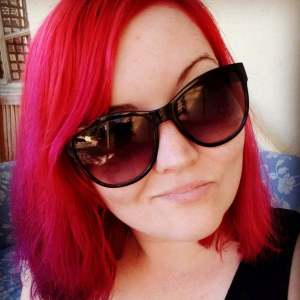Today’s guest diagnosis story comes from 26 year old Maggie.
“While the 10 or so different diagnoses I’ve received over the years have indeed been mostly valid and descriptive of what I was experiencing at the time, I always felt that there was more to it. More than being mostly introverted. More than being anxious. More than being highly sensitive.”
Maggie’s Diagnosis Story:
My name is Maggie O’Connor and I am a 26 year old female. I was diagnosed with Autism Spectrum Disorder Level 1 (formally known as Asperger’s Syndrome) in 2016. I sought a diagnosis because I halfheartedly completed an online ASD questionnaire and scored very highly.
I have an extensive history of various mental health issues. While the 10 or so different diagnoses I’ve received over the years have indeed been mostly valid and descriptive of what I was experiencing at the time, I always felt that there was more to it. More than being mostly introverted. More than being anxious. More than being highly sensitive. This curiosity led me to start reading about different conditions and in 2015 I started looking into autism comprehensively and obsessively.
I went through a lengthy and costly assessment process with two different professionals and in August 2016 emerged with the formal diagnosis. I was unhappy and unsatisfied with the way the first psychologist handled my request for an assessment so I ended up seeing another who specialize in autistic adults, as the first professional mainly had experience with children on the spectrum and I had developed a lot of coping strategies over the years that made diagnosing me slightly more challenging. The psychologist who ultimately made the diagnosis was confident in doing so within four 50 minute sessions. These included taking a thorough and detailed history and interviewing my parents and my best friend about my observable behaviour. I was very happy with his down-to-earth yet clinical nature. I felt confident that he knew what he was talking about. We spoke at length about how the diagnosis criteria applied to how I experience the world and he was happy with the diagnosis. I was delighted.
When I first suspected that this neurological difference may be the case in March of 2015, I was quite shocked. I thought I knew a lot about ASD, (it’d always been an area of interest for me) but the more I read about it and in particular heard other people’s detailed subjective experiences, the more it started not only to fit, but feel oh so familiar. It’s provided an explanation for so many of the things I’ve never really understood about myself, some of the things I experience in life and areas in which I struggle.
One of the reasons it was never picked up until now is because of the way it can present and manifests in females; generally we do a bit better socially and it seems to possibly be more common in males. Often girls and women on the spectrum are diagnosed later in life (sometimes after having a child that they discover is on the spectrum), misdiagnosed as having different mental illnesses (although there are definitely comorbidities in both sexes) or remain undiagnosed altogether.
Receiving this diagnosis has provided me with immense relief and a reason WHY (one of my favourite things!); an answer, the missing piece to my puzzling brain that I could never quite find in other areas of my search over the years. It’s also allowed me to give myself permission to accept, understand and forgive myself for a lot of things that have happened in my life as a direct result of ASD and my inability to cope effectively with certain things.
I was fortunate enough to be able to afford to be assessed by professionals. I understand not everyone is this lucky and it can be a real stressor for some. If one doesn’t require the diagnosis for reasons other than personal understanding, I believe that self diagnosis is extremely valid. There are many excellent resources online for further information and support. My hope for the future is that those on the spectrum can be provided with understanding, compassion, acceptance and support to be the very best version of themselves that they can be, because neurodiversity is so important in our society.
There’s a theory that speculates some of the greatest minds in history exhibited autistic tendencies. The world would be so dull, boring and things would be invented in a much slower fashion if all brains were all the same.
Go forth and be your amazing self. Good luck ❤
Thanks for reading my story 🙂


[…] ‘Aspergers From The Inside’ featured a piece I wrote about my Autism Spectrum Disorder diagnosis here. […]
LikeLiked by 1 person
Really incredible, I thought I was the only one. I wish I could just be myself and shout fxxx off when I hear Beyonce whailing, when help is unhelpful, when people and objects are in the way, when I feel not respected and adored by girls because they are self occupied and when misunderstood. And when I have to wait for some one that orders a cafe latte, Get a regular cafe au lait You are wasting my time.
LikeLike
This was well written and it is great to hear the experience of another female. Thanks for taking the time to write this!
LikeLike